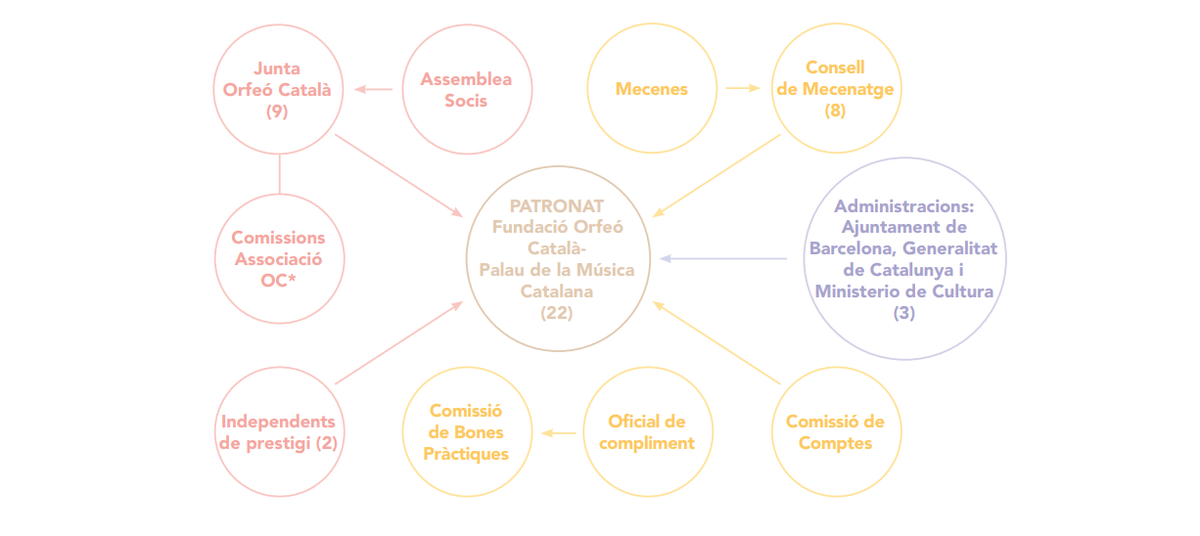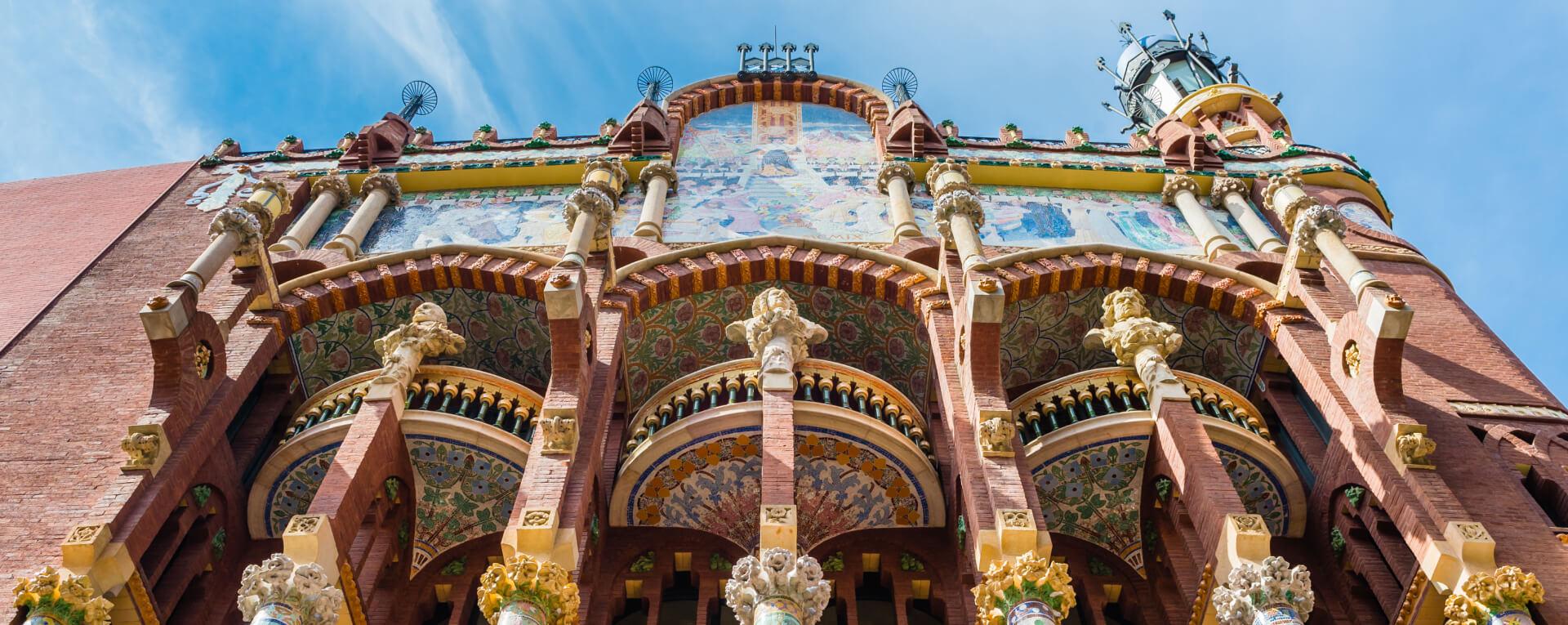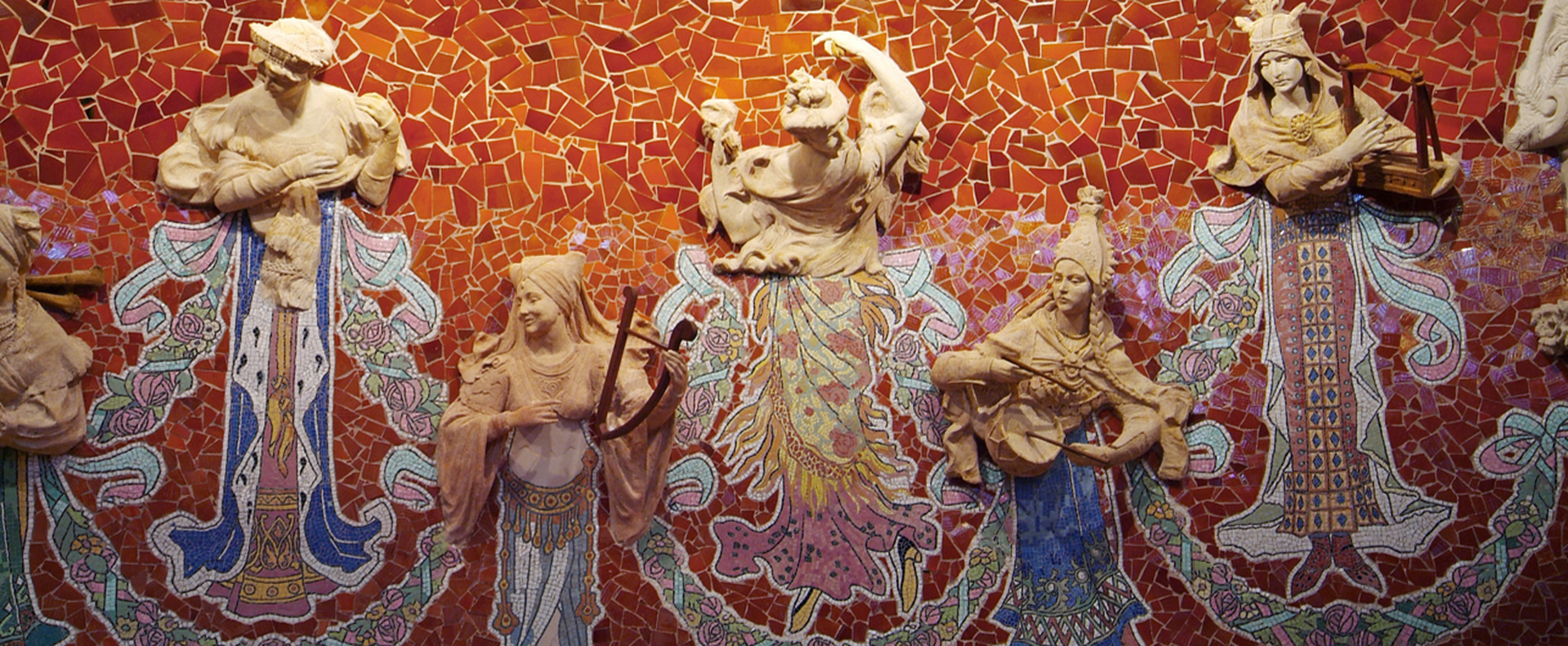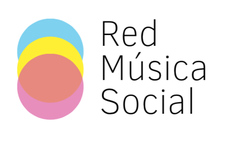Transparence and sustainability
Reports
Governing bodies
Board of trustees
Committee members
Generalitat de Catalunya: Josep Maria Carreté Nadal
Ajuntament de Barcelona: Xavier Marcé Carol
Ministerio Cultura: Paz Santa Cecilia Aristu
Jordi Cabré Trias
Mireia Carmona Sanz
Joaquim Coello Brufau
Lluís Domènech Girbau
Guillem Gascón Picallo
Xavier García-Moll Marimon
Mireia Tomàs Carulla
Maria Àngels Vallvé Ribera
Artur Carulla Font - Agrolimen
Enric Brazís Caubet - Endesa
Sonia Mulero Monroy - Fundació Banc Sabadell
Rafael Fernando Chueca Blasco- Fundació "la Caixa"
Sara Puig Alsina- Fundació Puig
Alfonso Rodés Vilà - Havas Media
Committees
- C. de Compliment i Governança
- C. Delegada
- C. Comptes
- C. Artística
- C. Mecenatge
- C. de Joves
The functions of all of them can be consulted in the Statutes as well as in the Code of Ethics and Good Governance of the Foundation.
Advisory Council
The Orfeó Català-Palau de la Música Catalana Foundation has created an Advisory Council with the aim of keeping the institution connected to society in order to respond to various advanced realities and trends that may affect the present or future of the organization.
Its role is advisory, and its main task is to propose criteria or make non-binding recommendations on realities, trends, and opportunities that may support the fulfillment of the organization’s mission, objectives, and values. Likewise, it may also issue warnings about risks or threats that could affect the institution’s future. Lastly, the Advisory Council will also serve to promote and increase the visibility of the Foundation in society and in the world at large.
Members:
Antoni Bassas Onieva, Mª Teresa Cabré i Castellví, Josep Caminal Badia, Mariona Carulla Font (Chairwoman), Aurora Catà Sala, Carlos Cuatrecasas Targa, Ramon Forn Argimon (secretary), Anna Gener Surell, Jordi Gual Solé, Marta Lacambra, Miquel Roca i Junyent, Carme Ruscalleda Serra, Jordi Sellas Ferres i Narcís Serra Serra.
Management Committee
General Management
Joan Oller
Deputy General Management and Communication Management
Judith Pi
Financial and IT Management
Emma Creus
People Management
Juan Carlos Vicario
Maintenance Management
Jesús Pinós
Patronage Management
Maribel Palau
Micropatronage Management
Núria Caralps
Artistic Management
Mercedes Conde
Visits Management
Àlex Garcia
Audience Management
Darío Fernández
Orfeó Català and Choir School Management
Maria Ibarz
Palau Vincles Management
Quima Farré
CEDOC Management
Marta Grassot
Internal contracting instructions
Contracts and agreements with public administration
Received grants
Valuation governance report
Budget OC-PMC Foundation
Foundation annual accounts
Whistleblowing channel
Commitment to the SDGs
The Palau de la Música Catalana is committed to maintaining its architectural and cultural heritage. The building is an architectural pearl of Catalan Modernism, the only concert hall declared a World Heritage Site by UNESCO (December 4, 1997), and is currently an unavoidable meeting point for the cultural and social life of Catalonia. In addition, it has become a symbolic and sentimental heritage of an entire people who identify with its history.
Maintenance of the architectural heritage
The Palau de la Música Catalana is a building with more than one hundred years of history that requires maintenance, updating and revision of all facilities, both in terms of heritage and as a concert hall, with its technical requirements. The aim is to improve the visitors' experience, preserve and add value to the architectural heritage of a building with more than a hundred years of history, renovating and modernizing equipment and technical resources that are essential and necessary for a concert hall in the 21st century.
Centro de Documentación del Orfeó Català (CEDOC)
The Documentation Center of the Orfeó Català (CEDOC) is a center specialized in musical documentation and especially in all the documentation that brings together the history of the Orfeó Català and the Palau de la Música Catalana. Due to the importance of its collection, it is considered one of the main music centers created by a private civil entity in Catalonia.
Revista Musical Catalana
The Revista Musical Catalana was born in 1904 under the orbit of the Associació Orfeó Català as a publication of musicological character and dissemination of musical activity in the Catalan area at that time. In 1936, it suffered the ravages of the Civil War and saw its trajectory interrupted until, in 1984, the Consortium of the Palau de la Música Catalana promoted the resumption of the publication. Since then - with two periods during which it was associated with the radio station Catalunya Música and, later, with the ESMUC - 374 issues have been published (in September 2021).
The Fundació Orfeó Català-Palau de la Música assumes a clear commitment to mutual development with the people who form part of the organization, seeking common objectives that allow for sustainable growth. The satisfaction and commitment of the entire staff to the institution is a key issue in the management of people.
Satisfaction and commitment
The Palau de la Música Catalana periodically conducts a work climate survey to see the results and work on improvements. In the last survey carried out in 2023, it should be noted as a strength that employees are generally satisfied with their work and experience a positive feeling of connection and commitment to the organization.
Equality and diversity
The Equality Plan is part of the internal regulations to promote the presence of women at all levels of the organization, to promote measures that favor the reconciliation of personal and family life and, finally, to face with full guarantee any incident that may arise from sexual or gender-based harassment. In this sense, an action protocol is included as an integral part of this plan for any case that may arise within the organization in terms of sexual harassment, gender-based harassment and moral harassment.
Health, security and welfare
The purpose of Occupational Health and Safety is to prevent occupational risks based on the human and material resources necessary to carry out preventive activities and to provide an adequate level of protection for the health and safety of workers. The effective integration of Prevention at work will ensure the control of risks, the effectiveness of the proposed preventive measures and the detection of deficiencies that give rise to new risks. Therefore, the document that integrates risk prevention in the company will be the Prevention Plan with the different instruments that we use for the management and implementation of this plan.
Training and professional development
From FOC-PMC we want to invest in continuous training to enable further training in the development of the work. FOC-PMC's training plan is comprised of a set of actions that are programmed based on the following structure:
a) Generic training aimed at groups or the entire workforce.
b) Specific training at an individual level on a specific professional subject.
More than 70% of the workforce has taken some training action.












Transparency